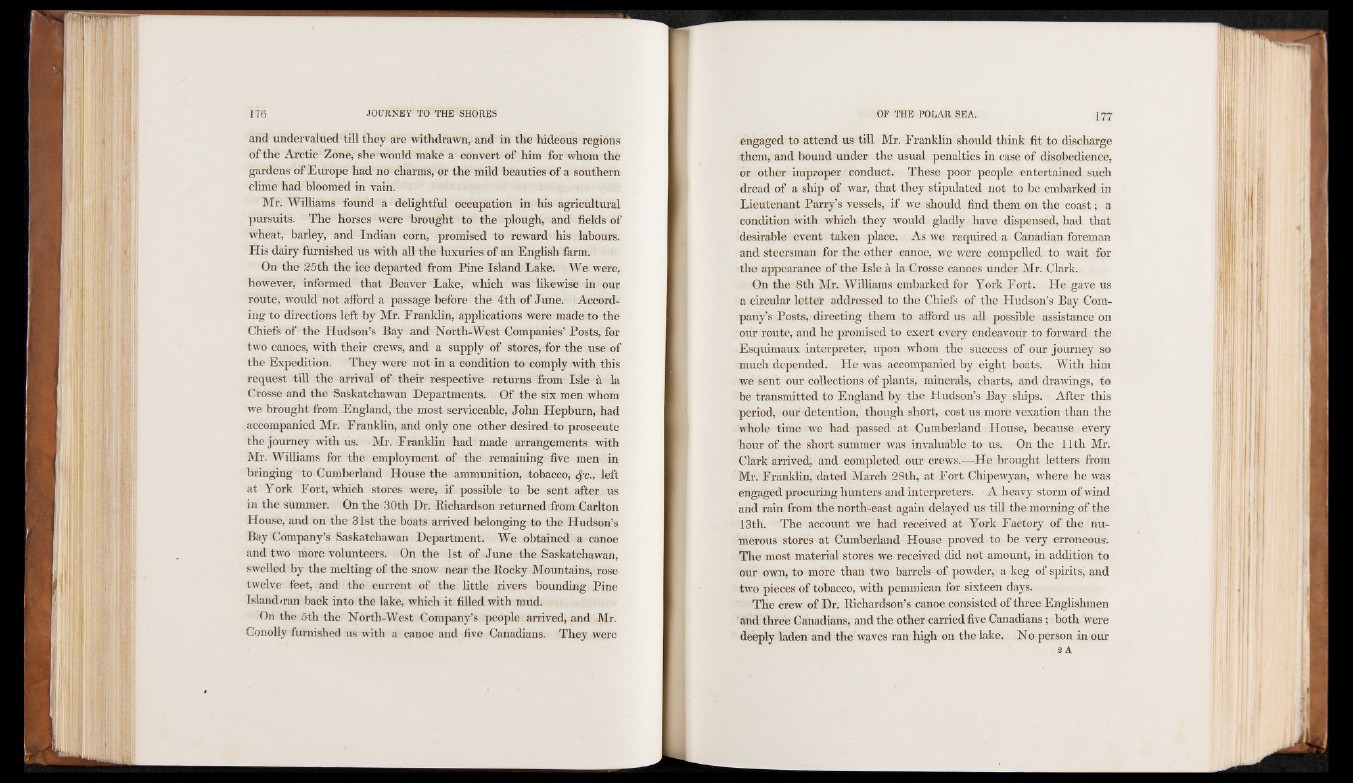
and undervalued till they are withdrawn, and in the hideous regions
of the Arctic Zone, she would make a convert of him for whom the
gardens of Europe had no charms, or the mild beauties of a southern
clime had bloomed in vain.
Mr. Williams found a delightful occupation in his agricultural
pursuits. The horses were brought to the plough, and fields of
wheat, barley, and Indian corn, promised to reward his labours.
His dairy furnished us with all the luxuries of an English farm.
On the 25th the ice departed from Pine Island Lake. We were,
however, informed that Beaver Lake, which was likewise in our
route, would not afford a passage before the 4th of June. According
to directions left by Mr. Franklin, applications were made to the
Chiefs of the Hudson’s Bay and North-West Companies' Posts, for
two canoes, with their crews, and a supply of stores, for the use of
the Expedition. They were not in a condition to comply with this
request till the arrival of their respective returns from Isle a la
Crosse and the Saskatchawan Departments. Of the six men whom
we brought from England, the most serviceable, John Hepburn, had
accompanied Mr. Franklin, and only one other desired to prosecute
the journey with us. Mr. Franklin had made arrangements with
Mr. Williams for the employment of the remaining five men in
bringing to Cumberland House the ammunition, tobacco, tyc., left
at York Fort, which stores were, if possible to be sent after us
in the summer. On the 30th Dr. Richardson returned from Carlton
House, and on the 31st the boats arrived belonging to the Hudson’s
Bay Company’s Saskatchawan Department. We obtained a canoe
and two more volunteers. On the 1st of June the Saskatchawan,
swelled by the melting of the snow near the Rocky Mountains, rose
twelve feet, and the current of the little rivers bounding Pine
Islandiran back into the lake, which it filled with mud.
On the 5th the North-West Company’s people arrived, and Mr.
Conolly furnished us with a canoe and five Canadians. They were
engaged to attend us till Mr. Franklin should think fit to discharge
them, and bound under the usual penalties in case of disobedience,
or other improper conduct. These poor people entertained such
dread of a ship of war, that they stipulated not to be embarked in
Lieutenant Parry’s vessels, if we should find them on the coast; a
condition with which they would gladly have dispensed, had that
desirable event taken place. As we required a Canadian foreman
and steersman for the other canoe, we were compelled to wait for
the appearance of the Isle a la Crosse canoes under Mr. Clark.
On the 8th Mr. Williams embarked for York Fort. He gave us
a circular letter addressed to the Chiefs of the Hudson’s Bay Company’s
Posts, directing them to afford us all possible assistance on
our route, and he promised to exert every endeavour to forward the
Esquimaux interpreter, upon whom the success of our journey so
much depended. He was accompanied by eight boats. With him
we sent our collections of plants, minerals, charts, and drawings, to
be transmitted to England by the Hudson’s Bay ships. After this
period, our detention, though short, cost us more vexation than the
whole time we had passed at Cumberland House, because every
hour of the short summer was invaluable to us. On the 11th Mr.
Clark arrived, and completed our crews.—He brought letters from
Mr. Franklin, dated March 28th, at Fort Chipewyan, where he was
engaged procuring hunters and interpreters. A heavy storm of wind
and rain from the north-east again delayed us till the morning of the
13th. The account we had received at York Factory of the numerous
stores at Cumberland House proved to be very erroneous.
The most material stores we received did not amount, in addition to
our own, to more than two barrels of powder, a keg of spirits, and
two pieces of tobacco, with pemmican for sixteen days.
The crew of Dr. Richardson’s canoe consisted of three Englishmen
' and three Canadians, and the other carried five Canadians; both were
deeply laden and the waves ran high on the lake. N o person in our
2 A